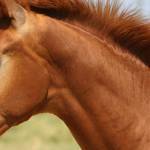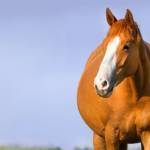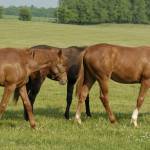Iodine Deficiency and Goiter in Horses

Goiter, an enlargement of the thyroid gland, may occur in response to deficient (hypoiodine goiter) or toxic (hyperiodine goiter) levels of iodine in the diet. Iodine is a component of the hormone thyroxin that is produced by the thyroid gland(opens new window). When iodine levels in the diet are inadequate to meet the horse’s requirement, the thyroid gland becomes enlarged, which is indicative of thyroid dysfunction.
Thyroxine is responsible for regulation of metabolic rate, and hypothyroid horses may exhibit slowed skeletal growth, rough hair coat, delayed shedding of hair, and muscular weakness. Foals born to mares that are deficient in thyroid hormone or iodine are frequently dysmature-appearing, lack a normal hair coat, and may or may not exhibit an enlarged thyroid gland. Supplementation of horses with iodized salt is generally adequate to meet iodine requirements, although most modern diets contain levels of iodine(opens new window) higher than those that would be obtained from consuming iodized salt alone.
If goiter appears in the presence of adequate levels of iodine in the diet, then iodine toxicity must be suspected. Workers at Cornell University have reported goiter(opens new window) in foals born to mares consuming high levels of a supplement containing kelp, a type of seaweed high in iodine. Levels of iodine intake as low as 50 mg/day by pregnant mares have resulted in goitrous foals. As such, random supplementation of mares with high-iodine supplements is not a good practice and the iodine provided from these supplements should be considered in assessing the iodine status of the horse’s diet. The symptoms of hyperiodine goiter are very similar to those seen in instances of hypoiodine goiter, so evaluation of the diet is the first diagnostic tool to use in determining the cause of the problem.
Goiter may also be caused by goitrogenic substances in the diet that exhibit an antithyroid activity. Feedstuffs known to exhibit antithyroid activity include uncooked soybeans, cabbage, kale, and mustard. The enzyme responsible for the antithyroid effect is inactivated by heating and cooking, so properly processed soybean meal is safe to feed. The goitrogenic effect of these feeds is not effectively inhibited by supplemental iodine, suggesting that with the exception of properly heated soybean meal, they should be avoided in equine diets.
Information in this article was taken from Advances in Equine Nutrition(opens new window).








